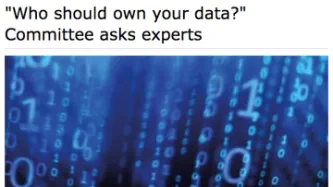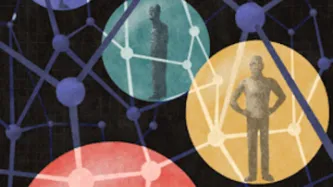Search
Content type: Long Read
In December 2017, Privacy International published an investigation into the use of data and microtargeting during the 2017 Kenyan elections. Cambridge Analytica was one of the companies that featured as part of our investigation.
Due to the recent reporting on Cambridge Analytica and Facebook, we have seen renewed interest in this issue and our investigation. Recently in March of 2018, Channel 4 News featured a report on micro targeting during the 2017 Kenyan Presidential Elections, and the…
Content type: News & Analysis
Privacy International’s Data Exploitation Programme Lead was invited to give evidence to the Select Committee on Artificial Intelligence at the U.K. House of Lords. The session sought to establish how personal data should be owned, managed, valued, and used for the benefit of society.
Link to the announcement of the session: https://www.parliament.uk/business/committees/committees-a-z/lords-select/ai-committee/news-parliament-2017/data-evidence-session/
Full video recording of the session:…
Content type: Advocacy
Privacy International's response to the inquiry by the House of Lords Select Committee on Artificial Intelligence.
Content type: Long Read
Disclaimer: This piece was written in April 2017. Since publishing, further information has come out about Cambridge Analytica and the company's involvement in elections.
Recently, the data mining firm Cambridge Analytica has been the centre of tons of debate around the use of profiling and micro-targeting in political elections. We’ve written this analysis to explain what it all means, and the consequences of becoming predictable to companies and political campaigns.
What does…
Content type: News & Analysis
Big data consists mainly of data that is openly available, created and stored. It includes public sector data such as national health statistics, procurement and budgetary information, and transport and infrastructure data. While big data may carry benefits for development initiatives, it also carries serious risks, which are often ignored. In pursuit of the promised social benefits that big data may bring, it is critical that fundamental human rights and ethical values are not cast aside.…
Content type: News & Analysis
Large institutions tend to focus internally, with minimal regard to the external environment. Open Databecoming institutionalised is not different, and as a leading edge country in opening data, the UK is making the predictable mistakes first:
The UK’s Department for Education (DfE) is currently considering opening data from the National Pupil Database. At a preparation event for this initiative, at which some data was released for use in an ‘appathon’, one participant believed he…
Content type: News & Analysis
Today, travelling within many cities around the world comes at a cost: privacy.
Electronic ticketing systems are proliferating, but it’s not clear how much information they collect or what they do with it. Privacy International has written to 48 transport authorities and companies operating transport services across the world requesting this data.
The kinds of personal information held about users of London’s Oyster card (which is used to travel by tube, train and bus) include full…
Content type: News & Analysis
The UK Minister for Education, Michael Gove, today stated in Parliament that he would be moving forward his plans to open up the National Pupil Database, and announced a government consultation on the initiative. The Minister promised that "all requests to access extracts of data would go through a robust approval process and successful organisations would be subject to strict terms and conditions covering their handling and use of the data, including having…
Content type: News & Analysis
Imagine a secret government list of suspicions and allegations, fuelled by unsubstantiated rumours provided by anonymous citizens with undisclosed intentions. The information contained in the list would not be measured against any legal burden of proof or supported by any credible evidence, but would – simply by its existence – become “fact”. Imagine, then, if the government could rely upon such “facts” to identify and implicate individuals for illegal behaviour. Such a system would be…
Content type: News & Analysis
This weekend, the Department for Education sponsored an "appathon", allowing attendees access to the National Pupil Database (which holds information like exam results, special education needs, truancy records and eligibility for free school meals on every child at every state school in the country) and inviting people to build "apps".
The database contains over 400 variables and the records of around 600,000 children. With so many variables, it is a relatively simple task to…
Content type: News & Analysis
An international alliance of organisations and individuals from 27 countries has lodged a petition calling on the Council of Europe to start an indepth survey on the collection and storage of biometric data by member states.
European governments are increasingly demanding storage of biometric data (fingerprints and facial scans) from individuals. These include storage on contactless 'RFID' chips in passports and/or ID cards. Some are going even further by implementing…
Content type: News & Analysis
Privacy International's recent complaint to the UK Information Commissioner has threatened to bring to a halt an imminent plan to fingerprint all domestic and international passengers departing from Heathrow's Terminal 1 and Terminal 5, due to begin on March 27th. The British media is reporting that in response to PI's complaint, the Information Commissioner has advised that passengers should only accept fingerprinting "under protest" until our complaint is resolved.
The prospect of…
Content type: News & Analysis
In a tipping of the hat to the Americans, the UK is set to establish the largest border surveillance programme to date. The new programme will involve the collection of biometrics on visitors to the UK, the generation of vast information stores on all Britons and visitors, and a profiling system to identify those worthy of further scrutiny.
This programme does not merely apply to combatting terrorism however; it is for use for general policing matters.
We have archived the 'partial'…
Content type: News & Analysis
In a number of reports released today, the UK government acknowledged that there has been an increase in stop and searches in the past year. According to the Home Office Stop and Search Team's Strategy Report, "Stop and search is a police power which, if used fairly and effectively, can play an important role in detecting and preventing crime and the fight against terrorism."
But they admit that the power is used increasingly in unfair ways:
This is under Section 95 of the Criminal…













